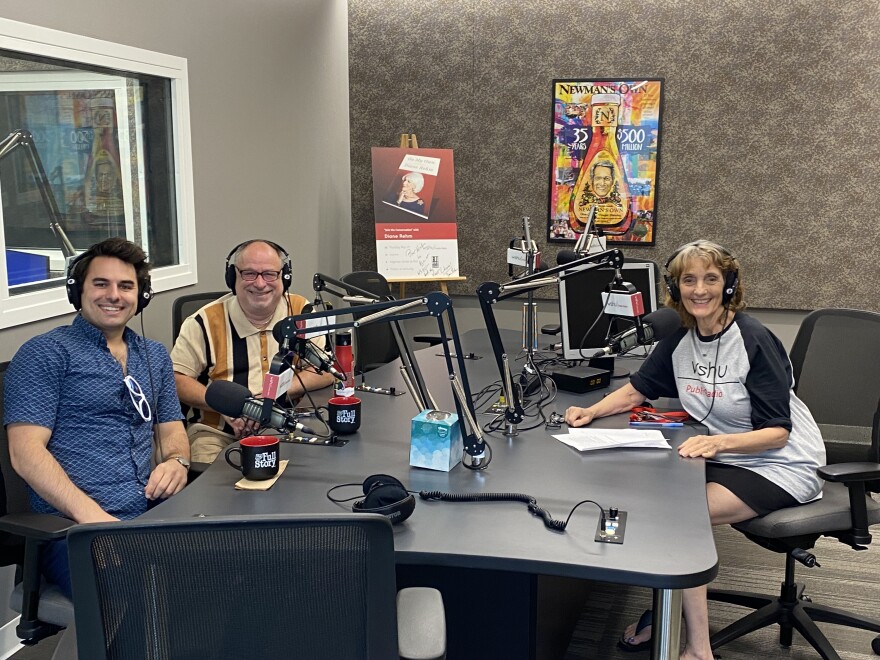The 1988 Los Angeles writers' strike put many actors out of work. But it also gave birth to a theater in Waterbury, Connecticut: The Seven Angels Theatre. WSHU's All Things Considered Host Randye Kaye sits down with the theatre's new managing director, Craig David Rosen, and artistic director, Constantine Pappas, to talk about the theatre's origins, its future, and its vital connection to the Waterbury community.
WSHU: The 1988 Los Angeles writers' strike put a lot of actors out of work, but it also gave birth to a theater in Waterbury, Connecticut. During the strike, Semina DeLaurentis was an equity actor working in television and various things in LA she decided to go back home to Waterbury and kind of wait out the strike with her family, but Semina wanted to work, so she reached out to six local businesspeople to explore the possibilities. These angels of the arts helped to bring off-Broadway plays like Nunsense to Waterbury. In 1990, the angels launched Seven Angels Theater, and it has been here to this day. Fast forward 35 years, and Semina has retired from the non-profit professional regional theater. Now, there's a new managing director, Craig David Rosen, and artistic director, Constantine Pappas, and they join me here today in the studio. Welcome, both of you.
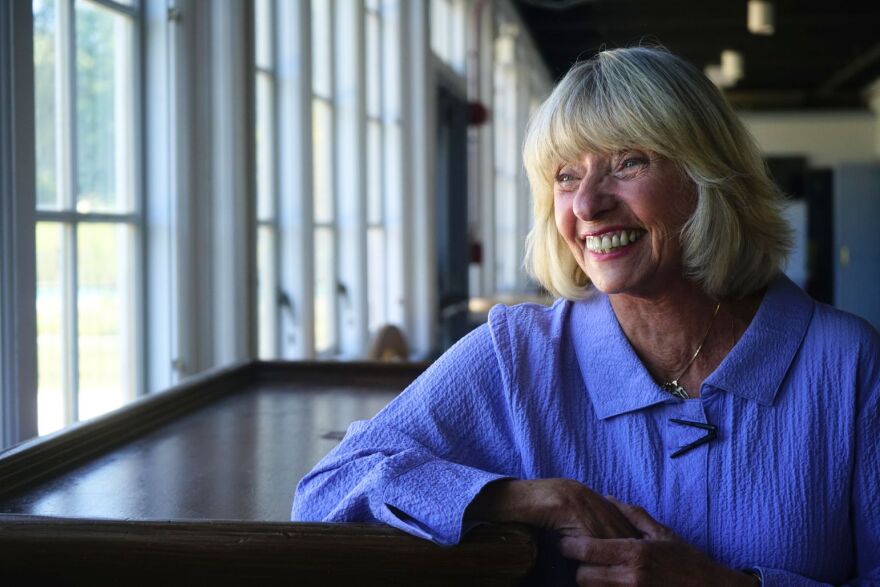
WSHU: So we were chatting a bit more before we turned the mics on, and when Semina retired, they had to hire two people to take her place. Is that how this works?
CDR: They had to hire two men to replace one woman.
CP: It's true.
CDR: Sounds about right.
WSHU: It sounds about right, absolutely. Now. Full disclosure, I have a little bit of a connection with your theater. I've gone to see some wonderful shows there, both in the professional and the community stage. But also, like Semina, I am a Danny Goggin Nunsense nun. I have done shows. I mean, she was Sister Mary Amnesia forever, maybe, one of his favorites; he was always talking about her.
CDR: I actually saw her in the original production of Nunsense, and she just stole the show, as far as I was concerned. I loved her.
WSHU: It's a fabulous part. I played sister Robert Ann, the one from Brooklyn, and in Nunsese Jamboree, I think I got to work the puppet. So that was fun. And also, Craig, I know you from summer camp. So we have a little bit of a connection. And you also produced a show I was in at the Ridgefield barn. Is it called Pageant?
CDR: Pageant. You were one of our pageant ladies. Yes.
WSHU: We've had a few connections in the past. So, can you tell me about the mission of Seven Angels as it is right now, and how you plan to carry that mission forward?
CDR: Well, the mission is to provide, you know, quality, professional, and community theater in the Waterbury area. We're the only producing theater in the greater Waterbury area. We want to keep live theater alive, which we all know is not as easy today as it used to be. So that people who can't make it down to New York or Broadway can see quality theater locally at an affordable price. This is our mission: to bring top-quality theater to the area.
WSHU: So I know you have headliner stages and other stages, and maybe you bring in acts for that, but for your theater shows, you are producing at the theater.
CDR:: Correct.
WSHU: Some on a professional level and some on a community level.
CDR: We do five professional main stage shows a year. We also do two community shows, one generally held in the summertime and one generally held around the holidays.
WSHU: That is so great. And what about kids and education? Is that part of the theater's work as well?

CP: It sure is. In fact, as we speak, we just kicked off our first week of our Seven Angels summer program, and we have kids ranging from seven years of age all the way up to 17. Over five days, these kids come in at 9 a.m. to 3 p.m., and they get to work on some music for a show, choreography. They get lessons in audition technique and just so many fun aspects of what it means, not just to do a show, but the applicable skills that we need to go forward in life. Simple things as public speaking, being able to project. Being able to maybe not show fake charisma, but just be natural and be yourself is a really huge aspect to that. Something I wanted to tack on to the mission of Seven Angels was, while we bring in these headliners, it's fostering artistic excellence. That we are a baseline. You're a part of our theater. It starts with the community. It starts with building you up and projecting you into tomorrow.
WSHU: That's so fantastic. Now, you know, I'm a self-described theater nerd, theater actor. At summer camp, it was all about theater for me, because for many people, you find your place to belong when you're doing the arts. Whatever the arts are. It could be visual, it could be theatrical, it could be music, it could be playing in an orchestra. There are so many things that the arts do for people and make you a part of something. And dare I say that AI can never replace theater? It can never replace theater. That feeling you get of doing something together. My own granddaughter just started doing some theater, and she was going through the rehearsal process, and I'm like, “Do you like it?” She goes, “I like it. I said, “Well, talk to me after the show's on the stage”. The Minute the show is done, she said, “ I gotta do this again” because there's something about doing something together and pulling it off that is so, so magical. So the kids in the program, do they keep coming back summer after summer? Is it competitive? Do you let everybody in? What's the situation?
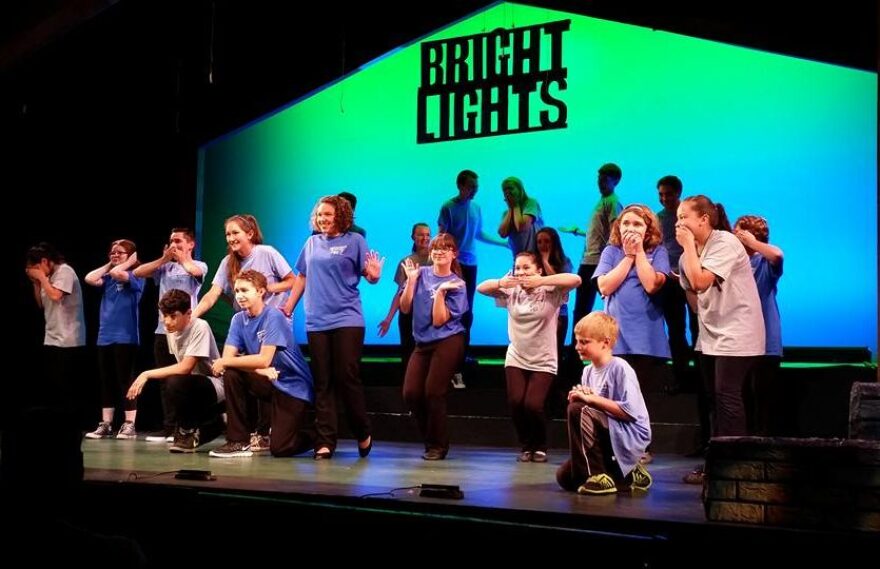
CP: We actually have a number of programs that we're hoping to continue, in terms of, you know, continuing the legacy of what Semina has brought to Seven Angels over the last 35 years. We have other programs, Seven Angels in the Schools, Bright Lights, Young Angels. And we're even continuing to develop those programs to see how much further we can go with them, how many more students we can impact. And so we have those, and we provide those.
CDR: And also for our summer workshop program, we offer scholarships too. Because there are kids who just can't afford it, and we don't turn any child away. We have had people who called up, “I can't afford it.” Send your child down. We will not turn a child away.
WSHU: And for people who may not know now, there is another theater in Waterbury, which I love, the Waterbury Palace Theater, but they don't produce their shows. They bring in the shows, which is wonderful. It gives people a chance to see Broadway-quality theaters, and that is wonderful, too, but your mission brings in people from Waterbury and the surrounding communities as well. How far do people go to attend your programs and your theaters?
CDR: Because we are a professional theater, we do hire Equity actors who come from New York. We have a cast house near the theater where we put up our out-of-town actors during rehearsals and the run of the show; they're right there.
WSHU: I know you have a board of directors, you have people, and Semina is on there. I believe she's staying involved with that. But how hard is it these days to get people away from streaming services? I won't name any streaming services that they can watch in their own living room. How hard is it to get people to come to the theater? Is it hard? Are you relying on people who've just done it for years? How do you get people in the seats?

CP: You can never replace live theater. What you see on the screen is perfection. That was the final 60th take of something, whereas with theater, there’s a risk factor with it being done for the very first time. Sometimes an actor forgets a line, sometimes the set doesn't drop, just something happens that you otherwise wouldn't get that experience if you just saw it on TV. Sure, you have something like Game of Thrones, where the Starbucks mug was left in post-production, fine, but that is so few and far between. But you can get that with life theater. And I'm not saying it's even mistakes.
WSHU: Don't come for the mistakes, then?
CP: I mean, you don't have to come for the mistakes, but you get that anticipation of everyone, the nerves that everyone comes in with. You get to watch that live. And there's, like I said, nothing that replaces live theater and a live performance.
CDR: And just to piggyback on that, when you look around the country, there are community theaters in these little towns in the middle of nowhere. So that just proves how important live theater is to people, and also to partly answer your question, Seven, as well as every other theater in the country, probably even the world, is thinking, 'How do we develop this next generation of actors as well as audience goers?' Because you're right with the streaming services and everything, that's the one thing I say when I'm talking to people. I take out my phone. I say, these kids today, they're here. This is where they are. But like Constantine, there's nothing like that person right in front of you. And I correlate it with going to a concert. Yes, you love hearing, you know, listening to the music on the radio, or your CDs, or whatever the CDs, I'm dating myself here with that reference, but you still like going to see them live in concert. Why? Because it's live. It's right there in front of you, and that's the same thing with theater.
WSHU: Oh, you don't have to convince me. A bad night of theater is better than a great night at the movies anytime.
CDR: Agreed.
WSHU: So I'm hoping that the younger generation will feel that, and I think that theater, when RENT came along and shows like that, the young people could see themselves on stage, not just Rogers and Hammerstein, I love. But you know, you want to be able to see yourself and your own stories being told on stage and with Fun Home.
CDR: Mean Girls and Legally Blonde. All those, yeah, exactly.
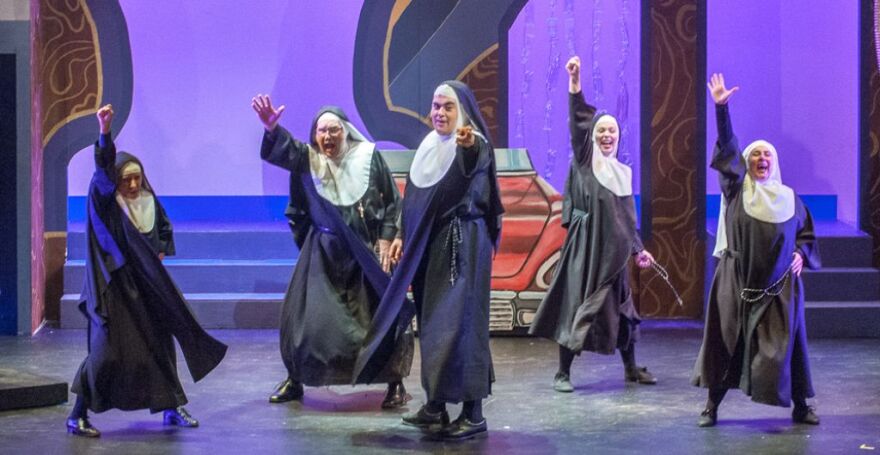
WSHU: So you want to bring the people in. So, how do you involve the community that doesn't necessarily want to be on stage but wants to be involved? Do you involve them in production or in picking shows? How do you get a family feeling? How do you foster that and get people in seats consistently?
CP: It's funny you ask that, because something that I feel is a very strong aspect of our theater is our volunteer program. And so we have folks come in, whether it be front of house, ushers, concessions, or bar management. They're able to come in and just be a part, be a part of the family. And that's something that was especially important to Craig and I, is that we come in and we say, look, Seven Angels Theater is not just a community. We are one big family. And when you're a part of us, you're part of the family. And so we have ways like that. We're also starting the development of seeing where we can have even a greater impact. Sometimes we may be short on, you know, someone coming in and painting the set. What if there is a community paint day where we actually work on something with the set, where you can actually learn some of the ins and outs of what it takes to put on a production, to put up the production, even on the technical side, even with maybe our adult acting classes. So we have ways to bring folks in to say, there's more to it than just “Oh, wow, that sounded really cool. I really like the show”. You can be a part of it in a small way.
WSHU: Yeah, imagine seeing a show and going, “I painted that pole. That's my pole. I painted that.” But I love what you say about family feeling, because I sometimes do trainings and speeches on human connection, because all of us in the theater, that's what it's about. There's something called collective energy where people are in a room together. And I always say that whenever I'm doing a training or we're starting a play, it's like we're going to create this collective energy together to do this play. And when the play closes, and they all close, and we all cry, then we each take a piece of that energy with us, out into the world, wherever we go. Also, every performance has its own collective energy, like I did Nunsense, think I did 26 weeks, and after a while, it's like, oh, it's Tuesday, time to start my work week. You know, you get that sort of thing, but then you get there and the audience has its own personality.
CDR: Well, I'm so glad you said that, because that is it. And for those of us who do theater, we know how important that audience is to us. First of all, that's why we're here for our audiences. Otherwise, we're sitting on a stage and there's no question of what we're doing, except standing on the stage. The audience makes a huge difference in your performance and the whole feeling of the evening. I'm talking to you. You know what it's like? You know, just that energy that you feel from the audience. One of the things that was funny was that I was just talking with Constantine about this yesterday. It's very hard to explain to people who don't do theater that the relationship is built, especially with the actors. You have to be vulnerable up there on that stage. You have to be open to those feelings. So you have to have a safe space where you can do that. And that's where the director, the producer, and the crew come in. Everybody is there to support each other. You develop this bond in a very short period of time.
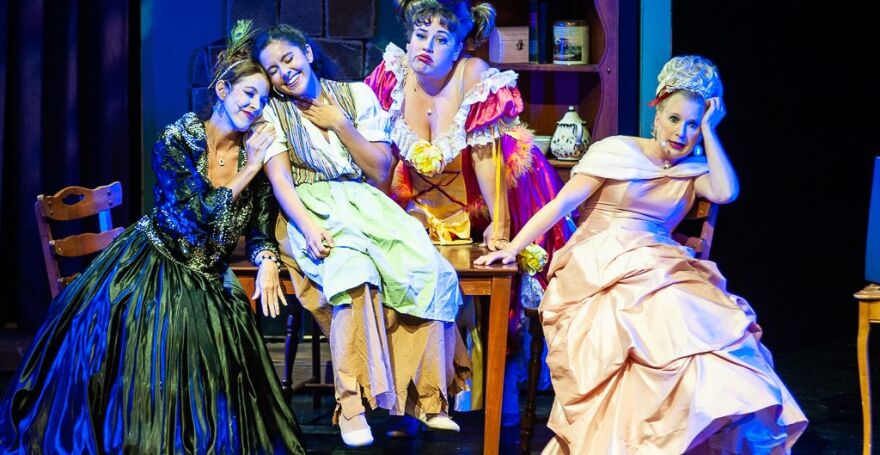
WSHU: Oh yeah, because the stakes are high. The stakes are high, and that's where it comes in. There's a rule in improv, which is, make the other person look insanely smart. And so, you know, we do that in the theater all the time. If somebody forgets their line, you don't go, “Hey, you forgot your line”.
CDR: You make something up for them.
WSHU: You say, you know what I think you meant to say was, because there's that, there's the high stakes, and that's people come for the high stakes. Listen, my daughter was thrilled when Denzel Washington forgot a line in a preview on Broadway. She's like, “I was there the night he forgot his line.” But we don't come here for that. We come for the communal experience of doing a show, being part of a show, being part of a family, something that is so missing for many of us these days. And there are a lot of theater programs that teach leadership. We talk about team sports a lot, and we don't talk about the arts enough, and you're providing that. And I would love to hear more about your missions and bringing it into schools and the adult acting classes, but let's start with your new season. I want to know what's coming up this season. What are you most excited about?
CP: Okay, I'm gonna level with you because of how late we came into the fold, we are still waiting to announce our full season.
Which is, in some cases, scary, but it presents a very unique opportunity for us, because now we're very much in the clear. Every theater in Connecticut has already announced its season. People know what's coming up. So then what happens when you get to announce something so close, so out in the open, and we are hoping, by the end of the month, if not the first week of August, to announce our full five-show season. I can say we have three shows set.
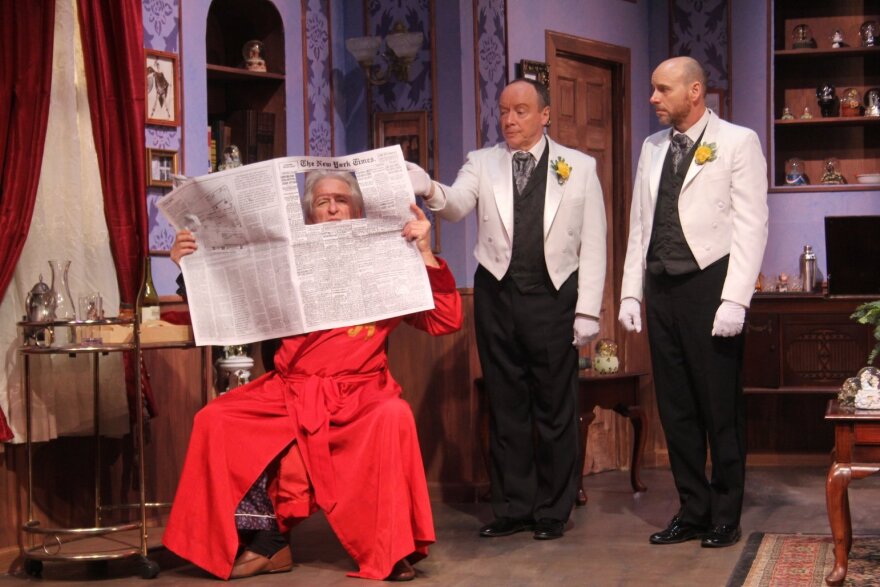
WSHU: My last question is, how can people get involved, help, donate, volunteer, or take a class? What is the best way? What do you need from the community to keep your wonderful work up?
CP: Seven Angels Theater is our website. On there under staff, you will find our emails.

